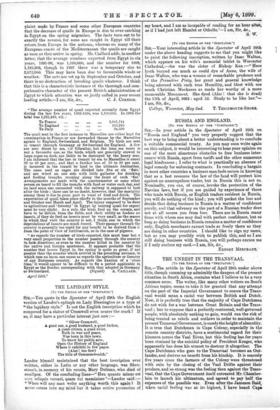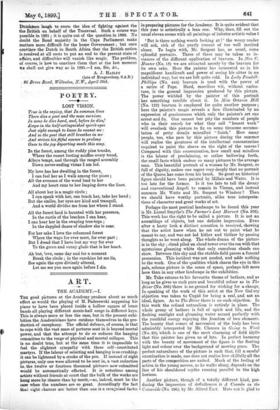THE UNREST IN THE TRANSVAAL.
[To THE EDITOR OF THY "SPECTATOR."] STE,—The article in the Spectator of April 29th under above title, though summing up admirably the dangers of the present situation in South Africa, contains what I believe to be a very common error. The writer, like many other writers on South African topics, seems to take it for granted that any attempt on the part of the Imperial Government to coerce the Trans- vaal would mean a racial war between British and Dutch. Now, it is perfectly true that the majority of Cape Dutchmen do not wish for a war between Great Britain and the Trans- vaal; but to suppose that a perfectly contented, well-governed people, with absolutely nothing to gain, would run the risk of being treated as rebels and outlaws in order to maintain the present Transvaal Government, is surely the height of absurdity. It is true that Dutchmen in Cape Colony, especially in the remote country districts, have a sentimental regard for their kinsmen across the Vaal River, but this feeling has for years been strained by the suicidal policy of President Kruger, who apparently has done his utmost to destroy it altogether. The Cape Dutchman who goes to the Transvaal becomes an Out- lander, and derives no benefit from his kinship. It is scarcely five years since the farmers of the Colony were threatened with ruin by the closing of the Vaal Drifts against their produce, and so strong was the feeling then against the Trans- vaal, that the Cape Government itself entreated Mr. Chamber- lain to launch his ultimatum, and agreed to pay half the expenses of the possible war. Even after the Jameson Raid, when racial feeling was at its highest, I have heard Caps Diitehinen laugh to scorn the idea of fighting against the the British on behalf of the Transvaal. Such a course was possible in 1881; it is quite out of the question in 1899. No doubt the Bond majority in the Cape Parliament make matters more difficult for the home Government ; but once ccin*bace the Dutch in South Africa that the British nation is resolved at all costs to put an end to the present state of affairs, and difficulties will vanish like magic. The problem, of course, is how to convince them that at the last moment we shall not give way as in 1681.—I am, Sir, &c., A. J. HAILEY
(late of Krugersdorp, S.A.R.)
26 Bruce Road, WIllesden, Tr, April 29th.







































 Previous page
Previous page